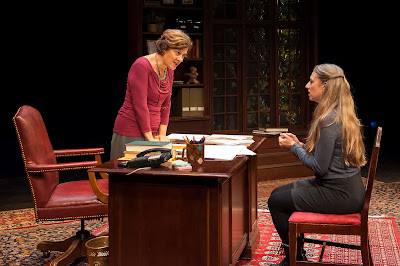 |
| Aimee Doherty in a scene from the Stoneham Theatre's production of "Double Indemnity" through Nov. 4. Photo: David Costa |
In past seasons, that has included shows such as Agatha Christie’s “And Then There Were None” and “The Mousetrap,” “Gaslight,” “Strangers on a Train,” “The Turn of the Screw,” “Dracula,“ and even “Lizzie Borden: The Musical.”
Stoneham has gone into the breech again with the stage adaptation of the James M. Cain classic “Double Indemnity,” which was made into a 1944 film directed by Billy Wilder and has since been adapted for the stage by David Pichette and R. Hamilton Wright. The movie, which starred Raymond Chandler, Barbara Stanwyck and Fred MacMurray, is widely credited with inventing the film noir genre.
Stoneham’s excellent cast milks every last ounce of suspense from the piece and director Weylin Symes skillfully navigates the twists and turns of the plot.
Here, Cain’s characters are anti-heroes. No one is on the level; everyone, with one exception, has an angle and is playing each other. Each character is more flawed than the next, beginning with Lewis Wheeler’s slimy insurance agent, Walter Huff, who breaks down the fourth wall right off the bat as our narrator who guides through the events of the evening.
Huff makes a routine stop at the home of a client to renew a policy , and gets a lot more than he bargains for. He makes an instant connection with Phyllis Nirlinger (a smoldering, sexy Aimee Doherty), the wife of his client. From the very beginning, she’s buying what Wheeler is selling, and it’s not insurance.
 |
| Lewis Wheeler and Aimee Doherty in a scene from the Stoneham Theatre's production of "Double Indemnity." Photo: David Costa |
As an insurance agent, Huff knows the ins and outs of accidental death policies that pay beneficiaries double under certain circumstances -- aka double indemnity. That also is not good for Herbert Nirlinger.
Of course, Huff soon forgets that someone who would betray her own husband might in turn betray him.
McGuirk returns in the second act for a sharp turn as Keyes, a dogged insurance investigator who smells a rat in Herbert Nirlinger’s death and is determined to piece together the puzzle.
Michael Underhill and Melis Aker provide strong support in a variety of roles, Aker most notably as Herbert Nirlinger’s daughter Lola, who has had suspicions all along about her stepmother and who also finds refuge in Huff’s arms.
This type of show is tricky business. It can come off as campy or cheesy unless you create the proper atmosphere, and that falls on those providing the production values.
Christopher Ostrom’s lighting, scenic design and projections show the way. The set features movable panels that allow the action to move swiftly and surely from place to place, and Wheeler to step forward out of a scene and address the audience when the situation calls for it
Ostrom’s lighting accents the shadows and dark corners that are a big part of the play, and the sepia projections used as scenic backdrops are also effective in setting the tone.
Add to that the excellent sound design by Nathan Leigh (“Hound of the Baskervilles,” “Strangers on a Train,”), including spot-on sound effects and a throbbing, suspenseful score, the period costumes by Rachel Padula Shufelt, and suddenly you are right back in the 1940’s and up to your ears in murder and intrigue.
The Stoneham Theatre production of James M. Cain‘s “Double Indemnity,” adapted for the stage by David Pichette and R. Hamilton Wright. Directed by Weylin Symes. At the Stoneham Theatre through Nov. 4. For tickets, call 781 279-2200 or go to www.stonehamtheatre.org.





+Car.jpg)
+and+Mother+(Shonna+Cirone).jpg)

+and+Mother+(Shonna+Cirone).jpg)
+Car.jpg)


